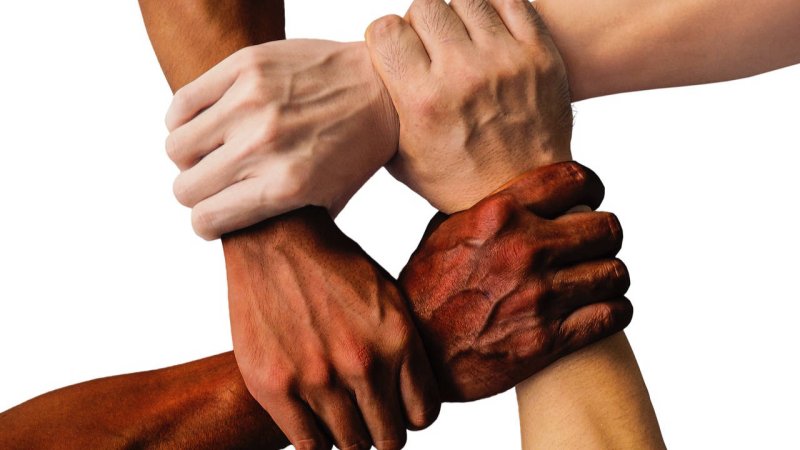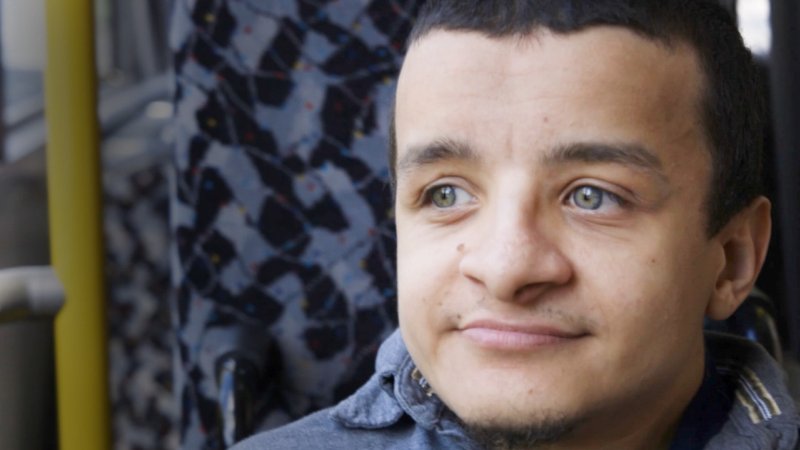
*** May 23, 2024, marks the 75th anniversary of the German Basic Law, that is, the German constitution, which is the basis of our coexistence in a free and democratic constitutional state. The Basic Law was promulgated in 1949. In the aftermath of the atrocious crimes committed during National Socialist tyranny, the creators of the Basic Law decided that human dignity should be paramount in the new law; so that nothing like the Nazi era ever happens again in Germany. You can learn more about the Basic Law in our video series: „Was wäre wenn?“ ***
The Basic Law or "Grundgesetz" is the constitution of the Federal Republic of Germany. It includes the most fundamental rights that determine the way society is organised in Germany. No other law may contradict the Basic Law. For instance, the Asylum Act or the Criminal Law may not contain any ordinances which conflict with the Basic Law. The Basic Law is the most prominent body of law in Germany, hence stands above all others.
The Basic Law consists of 146 sections, i.e. "articles". The first 19 articles of the Basic Law contain the so-called "fundamental rights", i.e. the most significant human rights vis-à-vis the state, designed to protect the individual from despotism, injustice and violence from the state. Some of these fundamental rights, also referred to as "human rights", apply to everyone in Germany, regardless of residence status. The Basic Law also includes a set of other rights, referred to as "civil rights", which only apply to people who have German citizenship.
Established in West Germany in 1949, The Basic Law has been applying to all of Germany since the reunification of 1990. Many of the principles included are consequences of violations of human rights during the National Socialist dictatorship between 1933 and 1945. Fundamental rights have been given a central position in the Basic Law to ensure the atrocities of Nazi times cannot happen again.
The Federal Constitutional Court is in charge of monitoring and assuring compliance with the Basic Law. The government cannot simply amend it.
"Human dignity shall be inviolable."
Article 1 is the most important article in the Basic Law. All other fundamental rights refer to this article. The article states that every person is valuable because they are human. The value of a human being is called dignity. All people are equally valuable. The dignity of every human being must be protected, whether young or old, rich or poor, German citizen or not, etc.
"Every person shall have the right to free development of his personality insofar as he does not violate the rights of others or offend against the constitutional order or the moral law. -Every person shall have the right to life and physical integrity. Freedom of the person shall be inviolable. These rights may be interfered with only pursuant to a law."
According to this article, everyone in Germany is entitled to freedom and can live as he or she desires. One can get tattooed, listen to any type of music, and live life in his/her own way.
However, nobody can live their lives in a way that violates the rights of others or breaks the laws. For instance, smokers are free to smoke at home, but they may be prohibited from doing so at the train station because that would violate the right of others to clean air. Article 2 also asserts that no one is allowed to kill or injure another individual.
"All persons shall be equal before the law."
Article 3 asserts that all people have the same rights. Nobody should be discriminated against because of their gender, origin, language, belief, skin colour, sexual orientation or disability. The state must ensure no one suffers discrimination, e.g. on the job market or when looking for a flat. A landlord, for instance, may not reject a gay couple as a tenant because of their sexual orientation.
"Freedom of faith and of conscience, and freedom to profess a religious or philosophical creed, shall be inviolable."
This article maintains that practising all religions are allowed in Germany, and everyone is free to have any belief. All can pray as they wish- and nobody is allowed to disturb.
People are also free not to have a religion at all: Just like religions, different world views are allowed - everyone can believe in what he or she wants. Article 4 also declares that the state cannot force anyone to fight in a war.
"Every person shall have the right freely to express and disseminate his opinions in speech, writing, and pictures and to inform himself without hindrance from generally accessible sources. Freedom of the press and freedom of reporting by means of broadcasts and films shall be guaranteed. There shall be no censorship.-- These rights shall find their limits in the provisions of general laws, in provisions for the protection of young persons, and in the right to personal honour."
Article 5 declares that everyone is free to express their opinion—and the media must work without restriction. Nobody can forbid people from having an opinion or criticism of the state. The press can also report on everything. No one can ban the media from a particular topic, with only one exception: Violating others’ rights. So, for instance, spreading hatred, lies, or insulting others is prohibited. Hatred is not an opinion.
Freedom of expression and the press are vital for a democracy. Issues remain invisible without the freedom to speak and report, and corruption and arbitrariness can spread unhindered.
"Marriage and the family shall enjoy the special protection of the state."
According to this article, marriage and family are particularly protected, regardless of the couple's gender. In Germany, LGBTQIA+ can also marry, i.e., for instance, two women or men or non-binary individuals or persons who identify as another gender or none at all. And those who are married can enjoy specific rights, for instance, pay less tax. Families also have exclusive rights- whether it entails a couple or single parents. The parents don't have to live together either. Families are provided with financial aid from the state, such as child benefits. Article 6 also maintains that the state cannot interfere in the upbringing of children, but the parents must take good care of their children. Children who are mistreated or whose welfare is endangered can be removed from the family by the state.
"The entire school system shall be under the supervision of the state.-- Parents and guardians shall have the right to decide whether children shall receive religious instruction."
According to Article 7, the state oversees and regulates the schools. Private schools must also adhere to these regulations. According to the German federal system, the governments of each state determine specific school regulations at the local level. That is why the school systems in individual federal states differ to some extent.
Article 7 also asserts that no child has to attend religious classes. Parents can decide whether their child takes part in religious courses at school. The same applies to teachers—they cannot be obliged to teach religion as a school subject.
"All Germans shall have the right to assemble peacefully and unarmed without prior notification or permission. -- In the case of outdoor assemblies, this right may be restricted by or pursuant to a law."
Article 8 guards the rights of all German citizens to assembly. An assembly is a gathering of a group of people who have a common political goal. That means, for instance, a group of people dancing together or sitting in a cinema is not an assembly.
People can gather indoors or outdoors. Gatherings outside, i.e., "demonstrations" or "protests," need to be registered. They may be banned occasionally, for instance, if the city is afraid of unrest or violence. But it rarely happens—in principle, the state must ensure that demonstrations can take place. So often, another location or another day is sought and picked.
Carrying weapons is prohibited at assemblies. But people can speak freely, and, e.g. criticise the state.
Article 8 is a "civil right"; so it only applies to German citizens. However, non-Germans can also assemble in Germany, as the European Convention on Human Rights and the UN Convention on Human Rights grant them the right.
"All Germans shall have the right to form corporations and other associations. -- Associations whose aims or activities contravene the criminal laws, or that are directed against the constitutional order or the concept of international understanding, shall be prohibited."
This article says that all German citizens can establish associations and societies, such as private limited companies. It can pursue a good cause (like protecting bees or helping the homeless) -- or be a profit-oriented company. Individuals can form groups and fight together for common goals. However, it is forbidden to found an association which violates the law. Establishing a club of right-wing extremists or terrorists is therefore prohibited.
Article 9 also says that workers can form unions which fight for better working conditions. Similarly, employers can set up their own associations, i.e. employers' associations ("Arbeitgeberverbände").
Article 9 pertains to a civil right, i.e. it only applies to German citizens. Nevertheless, non-Germans can establish associations in Germany, as the European Convention on Human Rights, the UN Convention on Human Rights and the law on associations acknowledge such a right.
"The privacy of correspondence, posts and telecommunications shall be inviolable. -- Restrictions may be ordered only pursuant to a law."
This article introduces confidential communication as a fundamental right. No one is allowed to read our letters, emails or messages or eavesdrop on our phone calls. Not even parents, partners, teachers or the police can open our packages, nor, for instance, the Postmen can reveal from where a letter or packet comes.
But there is one exception: when someone is planning a crime, the police can read that individual's letters and messages and listen in on their conversations. Even then, the police need permission from a court to do so. The court allows such measures only if the police have sufficient reasons for suspicion.
Since 2017, the BAMF has been allowed to analyse the mobile phone data of asylum seekers under certain conditions. However, the prerequisite for such liberty is that
- the analysis is necessary to establish the identity and nationality of the foreign national and
- the purpose cannot be achieved by less intrusive methods.
If these requirements are not met, the procedure is unlawful—in other words, it is not permitted. This is according to a verdict from the Berlin Administrative Court dated 01.06.2021.
"All Germans shall have the right to move freely throughout the federal territory."
Article 11 says that all German citizens can travel freely and live wherever they want within Germany. But there is one exception: if somewhere is unsafe, for instance, the state can prohibit people from going there. The state can also require people with an infectious disease to remain in quarantine for a while.
Article 11 is a civil right, so it only applies to German citizens. However, citizens of other EU countries are also entitled to such freedom, as freedom of movement is established within EU law.
"All Germans shall have the right freely to choose their occupation or profession, their place of work, and their place of training. The practice of an occupation or profession may be regulated by or pursuant to a law."
According to Article 12, all German citizens are free to choose their profession, vocational training and workplace. No one can force an individual to learn a specific trade, study at a particular university or take up a specific job. However, there is no guarantee that you will manage to get the desired vocational training spot or job position.
Article 12 pertains a civil right, so it only applies to German citizens. Citizens of other EU countries also entitled to freedom of occupation since it is stipulated within EU law.
"Men who have attained the age of eighteen may be required to serve in the Armed Forces, in the Federal Border Police, or in a civil defence organization."
There is an extension to Article 12: Article 12a says that the state can force men to join the German army, "Bundeswehr". Up until 2011, all fit men aged 18 and over had to service the German military for nine months, during which they learned how to use weapons and got familiarised with the inner workings of the German army. Those who object to the idea can choose to take another form of service for 12 months - they can, for instance, work in a hospital. Since 2011, the obligation for young men to join the "Bundeswehr" has been lifted. Today, men and women can join the German military voluntarily.
"The home is inviolable.-- Searches may be authorized only by a judge or, when time is of the essence, by other authorities designated by the laws, and may be carried out only in the manner therein prescribed."
According to this article, homes (private spaces) are protected-- nobody is allowed to enter a flat without permission or eavesdrop on the residents or put them under surveillance. The same applies to all private spaces, whether it is a flat, a house, a tent, a room in a shared accommodation facility, etc.
But there is one exception: In an emergency, the Fire Department or emergency doctors can come into the flat, even against the residents' preference. Furthermore, if a person commits a crime at home (or plans to do so), the police can enter the place. In principle, however, police need court permission to do so. The police may only enter the flat without a court permit if it is entirely unavoidable. For instance, if someone calls the police to inform them that they have heard loud cries for help from the neighbouring flat. In cases like this, even if the people in the flat next door do not open, the police can and will enter the flat.
The so-called "Repatriation Improvement Act" (“Rückführungsverbesserungsgesetz”) of 2024 allows the police to enter rooms in shared accommodation centres when looking for a person who is to be deported. This is intended to streamline and accelerate the clarification of identity and the locating of people to be deported. In addition to the person’s room, the police are also authorised to enter the rooms of other people in shared accommodation facilities.
Various human rights organisations, such as Pro Asyl and the Committee for Fundamental Rights and Democracy, criticise the new law as an infringement of people's fundamental rights and a violation of the German Basic Law.
"Property and the right of inheritance shall be guaranteed. Their content and limits shall be defined by the laws.-- Property entails obligations. Its use shall also serve the public good."
Article 14 protects the right to private property. Nobody is allowed to take away what does not belong to them. The state may dispossess someone of a property but only in exceptional cases. For instance, when a vital road has to be built, but someone's land is in the way, the state can claim the property, but must compensate the individual for it.
Article 14 also maintains that property should be used in such a way that it benefits everyone. A person who has many flats, for instance, should rent them out. If he instead decides to keep them vacant, the state can intervene.
"Land, natural resources, and means of production may for the purpose of socialization be transferred to public ownership or other forms of public enterprise by a law that determines the nature and extent of compensation."
According to this article, the state can take away someone's property-- but it only applies to meadows and forests, coal mines, factories, etc. The state can seize such pieces of a property when a corresponding law requires it. Then, effectively, they will belong to everyone in Germany.
Article 15 has not been acted upon so far. When the Basic Law was established, divergent views about economic policies were controversial. Namely, whether larger companies should belong to a single person or people should be the owners of such enterprises was a subject of fierce debate.
"No German may be deprived of his citizenship. Citizenship may be lost only pursuant to a law, and against the will of the person affected only if he does not become stateless as a result.-- No German may be extradited to a foreign country. A different regulation to cover extradition to a Member State of the European Union or to an international court of law may be laid down by law, provided that constitutional principles are observed."
Article 16 maintains that no one can be deprived of German citizenship. There is only one exception: When a corresponding law allows it and the person also has another nationality. The objective is to ensure that no one becomes stateless. There is, e.g. a law which says that a German citizen who has fought for ISIS can lose German citizenship- but only if he/she holds another (second) citizenship.
The article also states that German citizens cannot be extradited to another country. When another state wants to put a German citizen on trial, he/she has the right to remain in Germany. But here is an exception: if the court in question is an international court or within the European Union, the person can be handed over. The crucial prerequisite is that the legal process there is fair.
"Persons persecuted on political grounds shall have the right of asylum."
Article 16 has an addition: Article 16 a, which maintains that individuals persecuted for political reasons are to be granted protection in Germany. If a person is persecuted or tortured by the state in their home country, he or she has a right to asylum ("Asylrecht"), i.e. they can move to live in Germany. Right of asylum only applies to people who come to Germany from a non-secure country. If someone enters Germany via another "safe country", Germany will not grant them asylum. But then, the individual can e.g. be recognised as a refugee. Refugee protection ("Flüchtlingsschutz ") is not regulated in the Basic Law.
The right of asylum is included in the Basic Law because, during the Nazi dictatorship, many people from Germany had found protection in other countries.
"Every person shall have the right individually or jointly with others to address written requests or complaints to competent authorities and to the legislature."
According to article 17, everyone in Germany can directly take their requests or complaints to the government or the authorities. The state must examine all requests or/and complaints and react to them. If a person has an inquiry or wants to complain, they can simply write a letter or an email to the government, i.e. the responsible authority (for instance, the Tax Office). The only requirement is that the name and address of the person are mentioned in the correspondence.
"Whoever abuses the freedom of expression, in particular the freedom of the press, the freedom of teaching, the freedom of assembly, the freedom of association, the privacy of correspondence, posts and telecommunications, the rights of property, or the right of asylum in order to combat the free democratic basic order shall forfeit these basic rights. This forfeiture and its extent shall be declared by the Federal Constitutional Court."
This article asserts that no one can violate fundamental rights. If a person violates the fundamental rights of others, they lose their fundamental rights. In this way, the state can prevent a person or a group from attacking the fundamental rights of others. Furthermore, only the Federal Constitutional Court can decide whether taking away someone's fundamental rights are permissible.
So far, the state has tried four times to deny someone's fundamental rights- and the court has rejected each case.
"Insofar as, under this Basic Law, a basic right may be restricted by or pursuant to a law, such law must apply generally and not merely to a single case. In addition, the law must specify the basic right affected and the Article in which it appears. -- In no case may the essence of a basic right be affected."
Article 19 maintains that the state must not change fundamental rights. The state can only make small amendments. However, these changes must apply to all people. It is forbidden to make exceptions only for a specific group of individuals. If a person believes that the state is violating their rights, they can sue the state.
Fundamental rights are the most significant rights to which people in Germany are entitled. It is crucial to know your rights to be able to protect yourself.
If you face discrimination based on your sexual orientation or your gender identity, you can contact the Anti-discrimination Agency.
The fundamental rights in German law are explained in easy German on the website of the Bundeszentrale für politische Bildung (bpb).
What are the social norms in Germany? What should you consider when it comes to food, greetings and emergencies? The refugee guide will give you some guidance. Find out in this mini guidebook to the German culture.
The Campaign for Victims of Police Racial Harassment has provided a list of counselling centres for those affected.
Here is the court ruling concerning the confidentiality of communication and mobile data.



